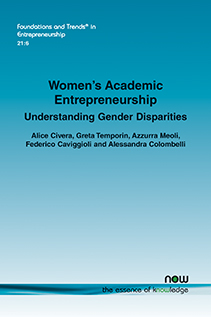Women’s Academic Entrepreneurship: Understanding Gender Disparities
By Alice Civera, University of Bergamo, Italy, alice.civera@unibg.it | Greta Temporin, Politecnico di Torino, Italy | Azzurra Meoli, University of Bologna, Italy | Federico Caviggioli, Politecnico di Torino, Italy | Alessandra Colombelli, Politecnico di Torino, Italy
Abstract
This monograph provides an overview of the current state of female participation in academic entrepreneurship and focuses on theories, approaches, and evidence in the university setting. Women represent a valuable yet underrepresented capital for economies and societies, and universities have recently made the effort to support and foster female participation in both science and entrepreneurship. However, differences in entrepreneurship rates between men and women still exist. This monograph offers a comprehensive framework drawn from the process-based concept of academic entrepreneurship, encompassing mindset, intention, and action. Each phase is discussed separately in terms of both student and faculty entrepreneurship, with the aim of detecting complementary findings and theories. Special focus is placed on the influence of context, since the unique factors of a university setting might mitigate the gender disparity in academic entrepreneurship and offer avenues for further investigation. In doing so, this monograph seeks to identify gaps in the field and areas for future research.
Women’s Academic Entrepreneurship: Understanding Gender Disparities
Women’s Academic Entrepreneurship: Understanding Gender Disparities provides an overview of the current state of female participation in academic entrepreneurship and focuses on theories, approaches, and evidence in the university setting. Women represent a valuable yet underrepresented capital for economies and societies, and universities have recently made the effort to support and foster female participation in both science and entrepreneurship. However, differences in entrepreneurship rates between men and women still exist. This monograph offers a comprehensive framework drawn from the process-based concept of academic entrepreneurship, encompassing mindset, intention, and action. Each phase is discussed separately in terms of both student and faculty entrepreneurship, with the aim of detecting complementary findings and theories. Special focus is placed on the influence of context, since the unique factors of a university setting might mitigate the gender disparity in academic entrepreneurship and offer avenues for further investigation. In doing so, this monograph seeks to identify gaps in the field and areas for future research.
